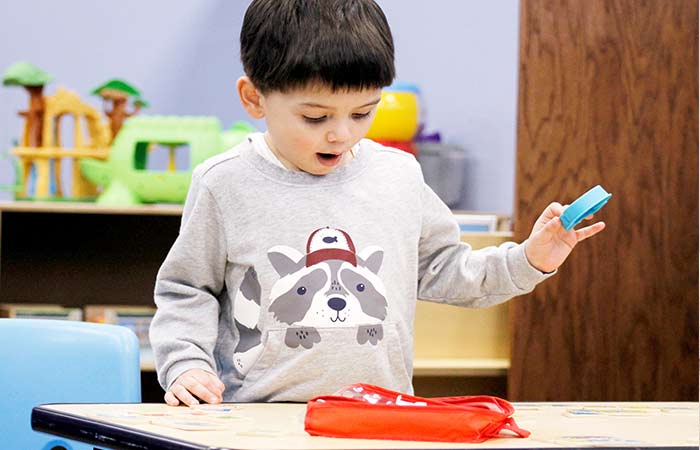Blog

Can ABA Therapy be used to treat ADHD?
At times, all parents struggle with managing their child’s behavior – this is part of parenthood! But for parents of a child with Autism or ADHD, these struggles and challenges can be more pronounced. And for parents of a child with BOTH Autism and ADHD, it can feel overwhelming.
Yet, we know that Autism and ADHD often go together, with up to 50% of children with Autism also meeting the criteria for ADHD. And while they are different diagnoses, many of the symptoms overlap.
This makes it difficult to decipher why a child struggles in certain areas or displays certain behaviors.
For example – does your child struggle with brushing their teeth because of the sensory sensitivities associated with Autism, or because of the inattentiveness common in ADHD? Or is it a combination of both?
And ultimately, does the “why” even matter? At the end of the day, you just want your child’s teeth brushed!
From a behavior therapy standpoint, the “why” does matter.
In order to change behavior, we need to truly understand that behavior.
Applied Behavior Analysis Therapy or ABA therapy as it is commonly referred to begins with analyzing behavior. Our ABA therapists are trained experts in deciphering the underlying reasons or motivations behind behaviors, and in implementing strategies to teach new skills, minimize disruptive behaviors, and increase positive behaviors.
Think of us as “detectives” working to understand your child’s behavior!
What is ADHD?
ADHD stands for Attention-Deficit/Hyperactivity Disorder. There are three main types:
1 – Inattentive/Distractible Type – A child with this type of ADHD may struggle most with:
- Paying attention
- Following directions
- Completing tasks
2 – Hyperactive/Impulsive Type – A child with this type of ADHD may excessively fidget, have difficulty sitting still, and act impulsively. Children with this type of ADHD may have trouble:
- Waiting their turn
- Staying seated during school or mealtimes
- Listening without interrupting
3 – Combined Type – This is the most common type of ADHD, and is a combination of the inattentive and hyperactive types.
Is ABA Therapy Effective in Managing ADHD?
Research has shown that ABA Therapy can improve the primary symptoms of ADHD – inattention, hyperactivity, and impulsivity. ABA can also help children with their communication and social skills.
According to The National Institute of Mental Health, ABA Therapy is most effective when used in conjunction with other interventions, such as parent training or ADHD medication.

How is ABA Therapy Used to Treat ADHD?
A diagnosis alone does not tell us the “why” behind a child’s challenges and behaviors. We don’t try to figure out if their behavior is “caused” by ADHD or Autism. Those labels don’t matter when it comes to managing and changing behaviors.
What does matter is the underlying reason for a behavior.
At Westside, we use a methodology called “Today’s ABA”, which utilizes the most modern and research-based techniques. “Today’s ABA” is about LISTENING to the child, and learning through an environment of joy, empowerment, and respect.
Kids are always communicating things to us, whether it’s through their words or through their actions. By listening and observing, we can learn a lot about their behavior, as well as their motivators and what brings them joy.
Going back to our example of brushing teeth – a few reasons a child may struggle with this are:
- Skill deficits – lack of fine motor skills to hold the toothbrush
- Sensory sensitivities – the feel of the toothbrush or toothpaste in the mouth
- Lack of focus – getting distracted or not remembering the steps
Our approach in ABA will vary based on the underlying reason for the behavior. For example, building fine motor strength is very different from desensitization, which is very different from organization and focus skills. For this reason, therapy at Westside is always 1:1, and each child has their own individualized therapy plan. Though the road to get there may look different for each child, the goal is to master the skill, one small step at a time.
In addition to daily living tasks like our example above, we also work on wider-reaching skills in ABA Therapy, such as mindfulness and executive functioning.
Mindfulness and self-monitoring skills help children to self-regulate, giving them more control over their behavior, actions, and response to the environment around them.
Executive functioning skills are skills related to planning, organization, following directions, and staying focused. Most children with ADHD have executive functioning deficits.
To work on these skills, we may think through how to organize a child’s room, or backpack, in a way that offers visual reminders or models. We may play games to work on sustained back-and-forth conversations, or work on planning skills by pretending to pack a bag for the beach. We might strategize on a process for completing homework that includes several breaks and reinforcers along the way!

Will insurance cover ABA Therapy for ADHD?
Illinois insurance covers ABA Therapy for children with an Autism diagnosis. For children with both Autism and ADHD, ABA Therapy can improve the behaviors associated with each. If your child has an ADHD diagnosis, without Autism, insurance will not cover ABA.
Please contact our office for any billing questions related to ABA Therapy. We can walk you through the costs associated with ABA based on your specific insurance plan. You can also check out our blog, “How to navigate the insurance process when starting ABA Therapy”.
What are the next steps?
ABA Therapy always begins with a comprehensive evaluation of your child. Based on this assessment, we build an individualized plan, schedule hours, and get to work play!
Here at Westside, we understand the many challenges that parents and children may face throughout the course of a day. We believe that daily life should not feel like a constant struggle.
We are here to help your child thrive and reach their full potential, as well as to make daily life run smoother for your whole family. Most importantly, we are here to have fun along the way, and we cannot wait to get to know your child!
To get started, please click the link below or call (815) 469-1500 and our team will walk you through the process.




